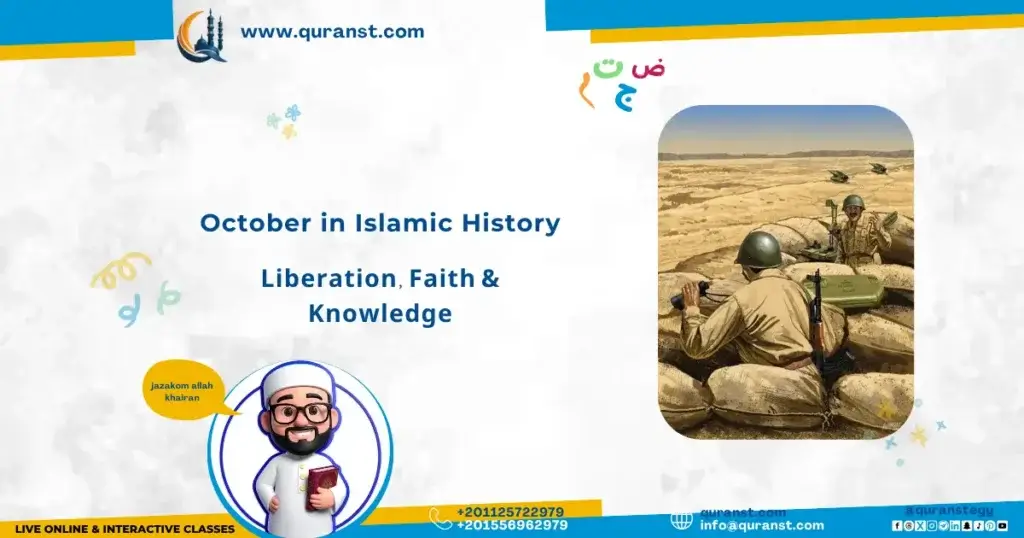Introduction: When History Speaks the Language of Faith and Will
In the memory of the Islamic nation, no month passes in vain; each carries within it a lesson of awakening, struggle, and thought.
The month of October stands out as a chapter of military courage, spiritual liberation, and intellectual enlightenment.
From the crossing of the Suez Canal in 1973, to the liberation of Jerusalem in 1187, and the martyrdom of the great scholar and statesman Nizam al-Mulk in 1092,
October reveals a recurring truth — the Muslim spirit that rises after every defeat and reclaims its place among nations.
1. The October War of 1973 – Crossing for Dignity and Restored Confidence
The Background
After the setback of June 1967, the Arab world lost vast territories in Sinai and the Golan Heights. Hope and confidence in the Arab armies faded.
Yet behind the silence, the spirit of faith and Arab determination was burning — and in secret, Egypt and Syria were preparing a coordinated strike to restore dignity and balance.
According to the Arab Encyclopedia and the Egyptian Information Authority, planning began in 1972 to determine the most effective timing for a surprise assault.
The chosen day was Saturday, October 6, 1973 (10th of Ramadan, 1393 AH) — coinciding with Yom Kippur, the holiest Jewish day, when life in Israel nearly stops.
📖 Sources: Arab World Encyclopedia, Vol. 12, p.114; Egyptian State Information Service, 2020.
The Course of Battle
At exactly 2:00 p.m., Egyptian artillery thundered across the Suez Canal — the Great Crossing had begun.
In just six hours, more than 80,000 Egyptian soldiers crossed the canal, breaching the so-called impregnable Bar Lev Line.
📖 Source: Abdel Monem Said, “October War: A New Reading,” Al-Ahram Center for Political Studies, p.44.
Simultaneously, Syrian forces advanced fiercely on the Golan front, penetrating deep into the occupied territories.
For more than twenty days, fierce battles raged until a ceasefire was imposed by the UN (Resolutions 338 & 339).
Yet the truest victory was not territorial — it was the shattering of fear and the revival of Arab confidence.
The Outcomes and Legacy
- The myth of Israel’s invincible army was broken.
- Egypt regained sovereignty over parts of Sinai, paving the way for future negotiations.
- The Arab and Islamic world regained moral strength and self-belief.
📖 Source: United Nations, Secretary-General Report S/11052, 1973, pp.3–5.
The October War proved that victory is not achieved by weapons alone — but by faith, strategy, and collective purpose.
It remains in Arab memory as The Crossing of Dignity.
2. The Liberation of Jerusalem, 1187 – The Banner of Salah al-Din
From Defeat to Renewal
When the Crusaders seized Jerusalem in 1099, the sacred city became a wound in the heart of Islam.
For 88 years, the adhan (call to prayer) was silenced in Al-Aqsa Mosque, and the blood of innocents stained its courtyards.
But Allah destined for this ummah a noble, courageous leader — Salah al-Din al-Ayyubi (Saladin) — who united faith with strategy, and mercy with justice.
📖 Sources: Ibn al-Athir, Al-Kamil fi al-Tarikh, Vol.10, pp.290–295; Ibn Shaddad, Al-Nawadir al-Sultaniyya, p.81.
The Battle of Hattin and the Path to Liberation
On July 4, 1187 (4th of Safar 583 AH), the decisive Battle of Hattin took place.
The Muslim armies triumphed over the Crusaders, capturing many of their leaders and kings.
By September 20, Salah al-Din marched toward Jerusalem, beginning a siege that ended on October 2, 1187 (27th of Rajab, 583 AH).
Muslim forces entered the city peacefully — no massacres, no revenge.
Salah al-Din raised the banner of tawhid (monotheism) over Al-Aqsa Mosque, purified it from defilement, and restored the call to prayer after 88 years of silence.
📖 Sources: Ibn Kathir, Al-Bidaya wa’l-Nihaya, Vol.12, p.303; Al-Maqrizi, Al-Khitat, Vol.4, p.112.
The Spiritual and Historical Significance
- The promise of Allah was fulfilled: “And We desired to favor those who were oppressed in the land.” (Qur’an, Al-Qasas 28:5)
- The adhan once again echoed through the holy sanctuary.
- The ummah was united after decades of division.
- Jerusalem became a symbol of faith’s triumph over tyranny.
The English historian Steven Runciman wrote in A History of the Crusades (Vol.3, p.467):
“Saladin entered Jerusalem not as a vengeful conqueror, but as a merciful liberator — writing a new chapter in the history of humanity.”
The Civilizational Meaning of Liberation
The liberation of Jerusalem was not merely a military victory — it was a civilizational awakening.
Salah al-Din exemplified the balance between the sword and the pen, founding schools and hospitals, and promoting the concept of “conscious jihad” guided by wisdom.
These values — faith, justice, and knowledge — are the same foundations that Quranst.com seeks to nurture in today’s generation through the light of the Qur’an and authentic Islamic thought.
3. The Death of Vizier Nizam al-Mulk – When Wisdom Fell to Treachery
Who Was Nizam al-Mulk?
Abu Ali al-Hasan ibn Ali al-Tusi, known as Nizam al-Mulk, was one of the greatest viziers of the Seljuk Empire.
Born in 1018 CE (408 AH), he served under Alp Arslan and Malik Shah.
📖 Sources: Ibn al-Jawzi, Al-Muntazam, Vol.16, p.43; Al-Dhahabi, Siyar A‘lam al-Nubala’, Vol.19, p.96.
He was both a statesman and a scholar — founder of the famous Nizamiyyah Schools in Baghdad and Nishapur, where scholars like Imam al-Ghazali studied and taught.
His Assassination
On October 14, 1092 (10th Ramadan 485 AH), while traveling with Sultan Malik Shah near Nihavand,
Nizam al-Mulk was assassinated by a member of the Isma‘ili Assassins sect.
📖 Source: Ibn al-Athir, Al-Kamil fi al-Tarikh, Vol.10, p.123; Islamweb Encyclopedia, “The Death of Nizam al-Mulk.”
His death was a great blow — politically and intellectually — as he embodied both wisdom in governance and reform in education.
His Intellectual Legacy
He immortalized his vision in his celebrated treatise “Siyasat Nama” (The Book of Government), a guide to just and wise rule.
He wrote:
“Kingdoms are preserved through justice, banners are raised through knowledge, and states fall through oppression — even if their armies are vast.”
📖 Source: Nizam al-Mulk, Siyasat Nama, trans. Muhammad Kurd Ali, pp.9–10.
His ideas continued to shape Islamic educational institutions for centuries, earning him the title “Architect of Islamic Statecraft in the 11th century.”
4. A Common Thread — Conscious Victory and Constructive Faith
Looking across history, October reveals one consistent pattern:
- In the October War, faith triumphed over arrogance.
- In the Liberation of Jerusalem, monotheism triumphed over oppression.
- In the Life of Nizam al-Mulk, knowledge triumphed over ignorance.
Together, these moments reflect the civilizational soul of Islam — a harmony between struggle and scholarship, defense and development.
5. Lessons from October
- Faith is the foundation of victory.
Neither the Suez crossing nor the liberation of Jerusalem was purely material; both were born of faith and unity. - Knowledge safeguards nations.
Without reformers like Nizam al-Mulk, nations lose their compass. - Righteous leadership shapes history.
From Salah al-Din to the generals of 1973 — leadership grounded in belief and wisdom endures. - Education preserves identity.
That is why institutions like Quranst.com strive to reconnect today’s youth with their heritage — keeping history alive not only in books, but in hearts and minds.
Conclusion: October Between Past and Future
October is more than a page on the calendar — it is a mirror of the Muslim soul.
From the crossing of the Suez to the liberation of Jerusalem, from the thought of Nizam al-Mulk to the teaching of al-Ghazali,
one timeless message emerges:
A nation that learns, unites, and draws strength from the Qur’an can rebuild its civilization and reclaim its destiny.
This is precisely the mission of Quranst.com —
to rekindle awareness in every generation, transforming education into a light that bridges past glory with future promise.


